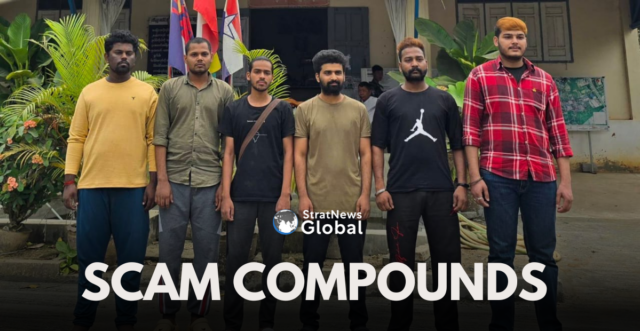The Indian Embassy in Yangon, Myanmar, has rescued six Indian nationals working in what are called “scam compounds”, places operated by criminal syndicates where cyber and job fraud is the name of the game.
The six happened to be the “thin end of the wedge”, with as many as 100 Indians being repatriated to India since July this year.
6 more Indian nationals trapped at scam-compounds in Myawaddy reached the local police station, for further deportation to India, y’day. 101 Indians repatriated to India since July 2024. We reiterate our advice against job offers in the area without consulting Missions.@MEAIndia pic.twitter.com/IFBYS56N5B
— India in Myanmar (@IndiainMyanmar) December 14, 2024
Clearly, in this Information Age, many people in India lack basic information, that a civil war has been raging in Myanmar since 2021. How else does one account for the fact that the Indian government has brought back 497 Indian nationals from that country, all if not most of them victims of online job scams.
External Affairs Minister S Jaishankar told the Lok Sabha on Friday, “We have seen particularly in southeast Asia, where fraudulent jobs are advertised. These are online scams. People are being taken to those countries, they are made to work in illegal places. From Cambodia we have brought back 1,167 Indian nationals and from Myanmar 497.”
Reports say criminal syndicates involved in these rackets are active in the Myawaddy region of Myanmar on the border with Thailand. It prompted the Indian Embassy in Yangon to issue a cautionary statement in July this year.
“We would re-emphasize the importance of adhering to our advisories on the subject for not taking any such job offers without consulting the respective Indian embassies.”
A racket in Cambodia and Myanmar has been targeting the youth since the last few years. The Indian Embassy has confirmed that Pha Lu area south of Myawaddy town, is one location where several Indian nationals had been trafficked. They included those from Malaysia and the UAE.
The Indian government has cautioned youth about accepting job offers being advertised on social media and unverified sources. It has recommended that the credentials of the employer be verified through the Indian embassy and has provided a contact in Yangon for further assistance.
Early this year, the BBC reported a similar job scam being run in Cambodia where Indian nationals were forced to undertake illegal cyber work. A UN report verified that in August 2023, over 120,000 people in Myanmar, and another 100,000 in Cambodia, were forced work in cyber-fraud schemes.
Young people were being promised jobs and then lured into illegal online work ranging from money laundering and crypto fraud to so-called love scams, where they posed as lovers online.
The civil war in Myanmar has clearly made it impossible for the government there to enforce its writ in these areas. What’s worse is that people, in their anxiety to land job, do not properly verify the antecedents of the firms or individuals offering what are lucrative assignments.
It’s only when they reach the location that they realise they have been duped, but too late to do anything about it.





